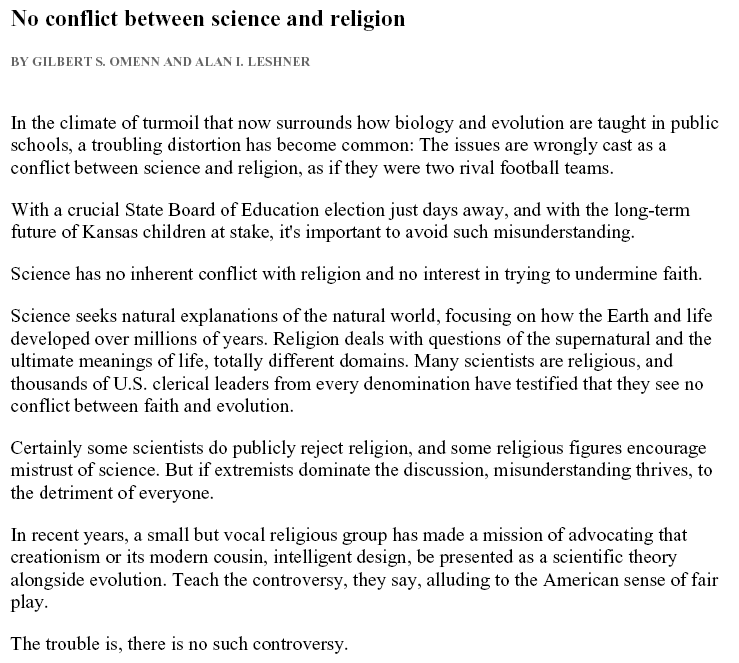|

|
|

|

|
|
These letters were sent
in response to editorials or articles with various unscientific
claims.
|
|
|
|
|
|
Original
Editorial:
The
following quotes are from an
editorial in The Wichita Eagle of July
30, 2006.
|
|

|
|
Conflict Between Science and
Religion?
The editorial by AAAS Chair Gilbert S. Omenn and CEO Alan I.
Leshner in The Wichita Eagle entitled “No conflict between science
and religion” (1) appears to have been good politics, as it may have
helped to overthrow the anti-evolution board members in Kansas.
But is this approach good for science? As scientists, we are
duty-bound to tell the truth. It is simply not true that there is no
conflict between science and religion. That’s what the whole debate
is about in the first place. The conflict has persisted for
centuries and probably will continue for centuries more.
As scientists, our experience with
the external world has led us to conservative assumptions that are
in opposition to the extreme assumptions of traditional mythology
(2).
We assume, for example, that matter and the motion of matter neither
can be created nor destroyed (conservation).
The opposing assumption,
creation of something from nothing, has no experimental
proof and thus must be regarded as the more extreme view. To
soft-pedal the contradiction between
conservation and
creation is a detriment
to science. Indeed, the usual obfuscation typical of the last
century now has led us to a so-called “scientific” theory that
speculates that the entire universe could be created out of nothing.
We should welcome the open debate, for pedagogical reasons if
nothing else.
Glenn Borchardt, Director
Progressive Science Institute
|
Corvallis Gazette-Times article mixing science and
religion:
http://www.gazettetimes.com/articles/2007/04/21/news/community/2aaa03_schori.txt
Our Letter: The fact that "Schori finds commonality in
science and religion" (G-T, April 27, 2007) is not surprising. The claim
that there is no conflict between science and religion is as ancient as it
is false. It may be good politics, but is it good for science? As
scientists, we are duty-bound to tell the truth. It is simply not true
that there is no conflict between science and religion. That’s why the
whole debate exists in the first place.
As scientists, our experience with the external world has led us to
conservative assumptions that are in opposition to the extreme assumptions
of traditional mythology. We assume, for example, that matter and the
motion of matter neither can be created nor destroyed (conservation). The
opposing assumption, creation of something from nothing, which is so
common among religions has no experimental proof and thus must be regarded
as the more extreme view. To soft-pedal the contradiction between
conservation and creation is a detriment to science. Indeed, the usual
obfuscation typical of the last century now has led us to a so-called
“scientific” theory that speculates that the entire universe was created
out of nothing. We should welcome the open debate, for pedagogical reasons
if nothing else. When will OSU open the forum to strictly scientific
views?
Glenn Borchardt, Director
Progressive Science Institute
Berkeley, CA
Author of the book, "The Scientific Worldview" (www.scientificworldview.com).
Overbye Essay in the New York Times of June 5, 2007 extolling the
pessimistic glories of Big Bang Theory. (http://www.nytimes.com/2007/06/05/science/space/05essa.html?_r=1&scp=2&sq=overbye+expanding+beyond&st=nyt&oref=slogin)
Our Letter:
Editor, New York Times:
The pessimistic essay by Dennis Overbye (The Universe, Expanding Beyond
All Understanding) is simply more of the usual claptrap concerning the
archetype of today’s systems philosophy: the so-called Big Bang Theory of
the origin of the universe. This remnant of the pre-Copernican view will
be put to rest in the next few decades, possibly by a scientifically
invigorated USA or most likely by rapidly developing China or India. The
last step in our intellectual evolution is to accept the assumption that
the universe is infinite and eternal. The archaic cosmological theory
promulgated by establishment science and accepted uncritically by US media
is headed for a resounding crash. The glorification of Einstein and his
religiously flavored assumptions implying an expanding finite universe
will continue apace, but the New York Times need not be a part of it.
Glenn Borchardt, Director
Progressive Science Institute
Berkeley, CA
Author of “The Scientific Worldview: Beyond Newton and Einstein,”
iUniverse, 2007 (www.thescientificworldview.com).
|

|

